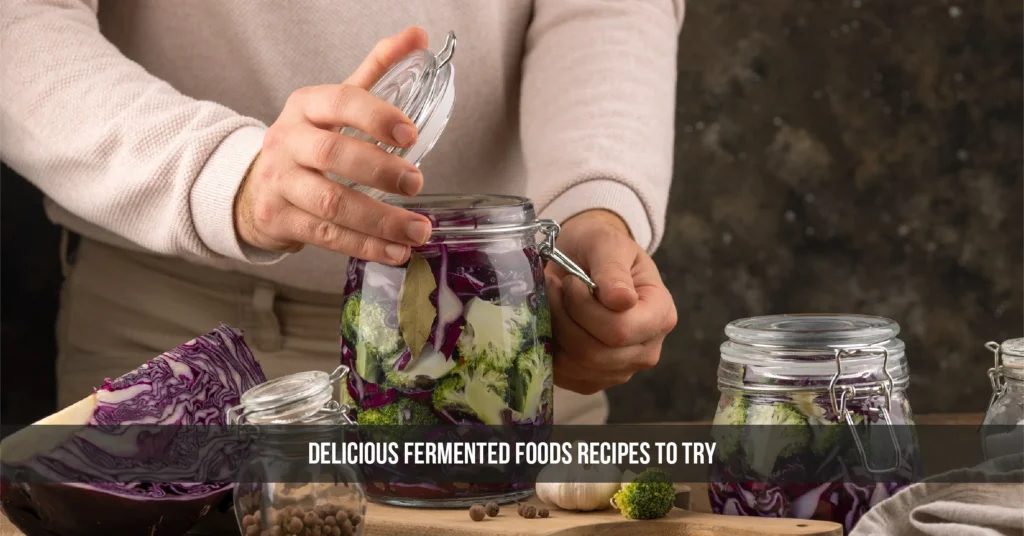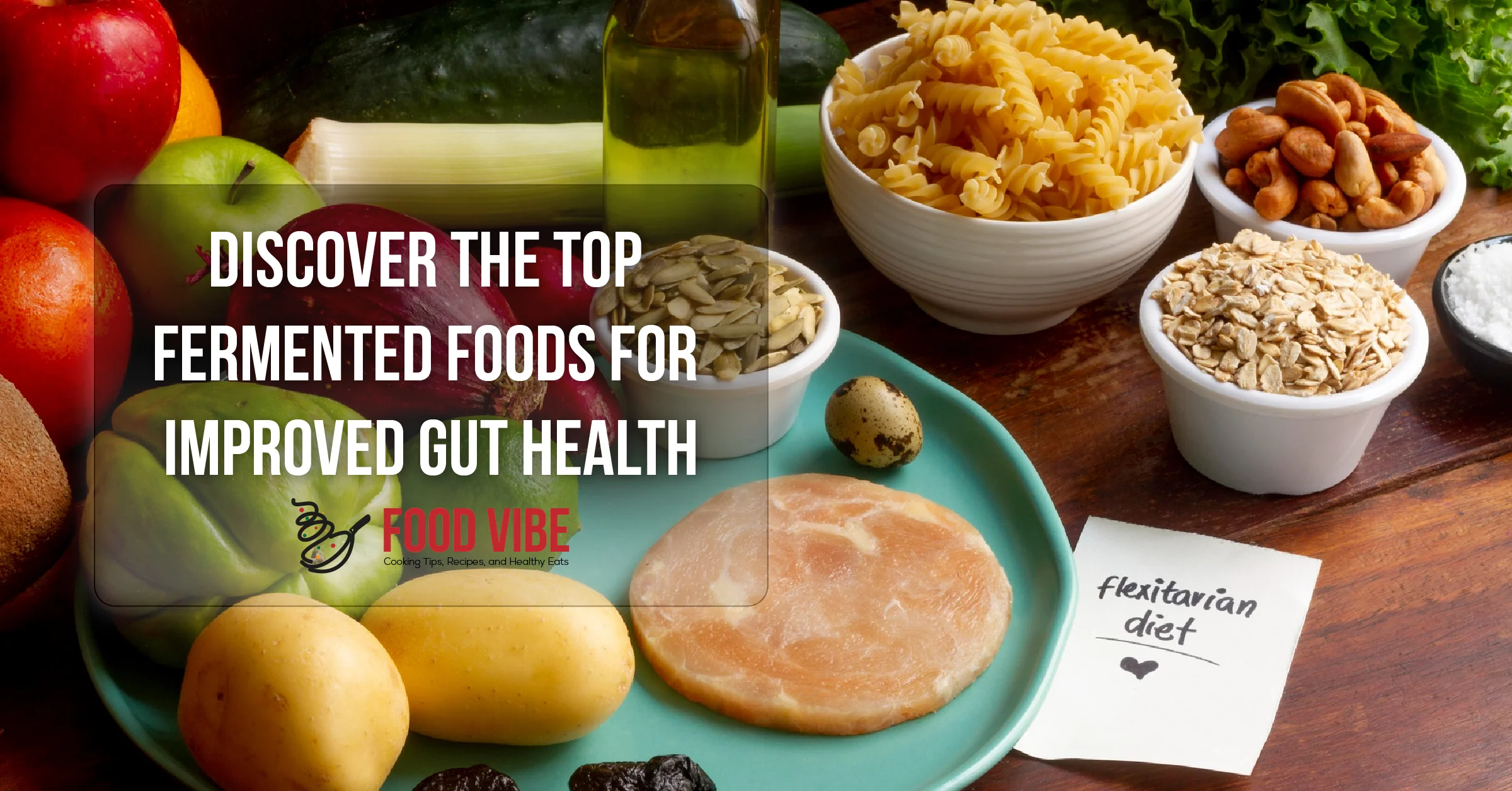Discover the Top Fermented Foods for Improved Gut Health
In today’s health-conscious world, knowing about gut health is key. Fermented foods, full of probiotics, are great for your gut. Adding these foods to your diet can improve digestion and boost wellness.
This article will show you the magic of fermentation. We’ll look at different probiotic-rich foods. You’ll learn how they can make your gut healthier, strengthen your immune system, and help with digestion.
Get ready to change your meals and improve your health with these nutritious foods.
Table of Contents
Understanding Fermented Foods and Their Importance
Fermented foods have become popular for their health benefits. You might ask, what are fermented foods? They are foods that have gone through a natural fermentation process. This changes their chemical makeup and boosts their nutritional value.
This process allows beneficial microorganisms to grow. These microbes are key to your health.
What are Fermented Foods?
Examples of fermented foods include yogurt, kimchi, sauerkraut, and kefir. These foods are full of live bacteria called probiotics. Probiotics are important for your gut health.
During fermentation, sugars and starches turn into acids and gases. This makes them easier to digest. It also increases their health benefits.
How Fermentation Works for Gut Health
It’s important to understand how fermentation affects health. During fermentation, bacteria, yeast, or molds eat sugars and starches. They turn them into lactic acid or alcohol.
This process not only keeps food fresh but also helps good gut bacteria grow. Eating fermented foods can improve digestion and nutrient absorption. It also helps keep your gut microbiome balanced.
By adding fermented foods to your diet, you help your gut and overall health.
What Are The Best Fermented Foods For Gut Health
Exploring different foods can greatly improve your gut health. Adding a variety of fermented foods not only adds flavor but also essential nutrients for digestion. Here are some top picks to add to your diet:
Exploring Various Options
- Yogurt: A common food, yogurt has live cultures that help your gut bacteria.
- Kefir: Like yogurt, but with more types of good bacteria, making it a probiotic powerhouse.
- Kimchi: A spicy Korean dish, kimchi is full of nutrients from fermented veggies.
- Sauerkraut: Fermented cabbage, it’s rich in vitamins C and K, plus probiotics.
- Miso: A fermented soybean paste, it’s full of flavor and good enzymes.
Key Nutrients Found in Fermented Foods
Knowing what nutrients fermented foods offer can make you appreciate their health benefits more. These foods are packed with:
| Nutrient | Benefit |
|---|---|
| Probiotics | Help keep your gut bacteria in balance. |
| Postbiotics | Boost gut barrier function and lower inflammation. |
| Enzymes | Help digest food and absorb nutrients better. |
| Vitamins | Give you important nutrients for health. |
Eating a variety of fermented foods can improve your gut health and overall health. Looking at a fermented foods list can help you add these benefits to your meals.
The Role of Probiotics in Gut Health
Probiotics are key for better gut health. They are live microorganisms, or “good bacteria,” that offer health benefits. You can find them in many probiotic-rich foods, helping keep your gut balanced.
What are Probiotics?
Probiotics are live bacteria and yeasts that are good for your health, especially your digestive system. You can find them in foods like yogurt, kefir, and fermented veggies. They help restore your gut’s natural balance, especially after stress or antibiotics.
How Probiotic-Rich Foods Benefit Your Gut
Eating probiotic-rich foods can greatly benefit your gut. These foods improve digestion and strengthen your gut lining. This makes your body’s protective barrier stronger.
With a healthier gut, you might have a better immune system and fewer stomach problems. These foods also support your digestive health, leading to a more balanced and vibrant life.

Top Fermented Foods to Include in Your Diet
Adding fermented foods to your diet can really boost your gut health. Here are some top picks, like kefir, kimchi, and sauerkraut.
Kefir: Your Gut’s Best Friend
Kefir is a probiotic drink made from fermented milk. It’s creamy and tangy, perfect for smoothies or as a drink. It’s full of good bacteria that help with digestion and boost your immune system. Drinking just one cup of kefir can make your gut microbiome more diverse, improving your gut health.
Kimchi: A Spicy Gut Booster
Kimchi is a spicy Korean dish that’s full of fiber and vitamins. It’s fermented, which makes its nutrients more available. This makes kimchi not only tasty but also great for your digestion. Eating kimchi regularly can help keep your gut healthy.
Sauerkraut: The Fermentation Classic
Sauerkraut is fermented cabbage that’s full of vitamins C and K, and probiotics. It has a tangy taste that goes well with many foods. Adding sauerkraut to your meals is an easy way to get its health benefits.
| Fermented Food | Key Benefits | How to Enjoy |
|---|---|---|
| Kefir | Boosts immunity, improves digestion | In smoothies, alone, or with fruit |
| Kimchi | Rich in fiber and vitamins, enhances digestion | As a side dish, in tacos, or in fried rice |
| Sauerkraut | High in nutrients, supports digestive health | On sandwiches, in salads, or as a topping |
Fermented Foods List for Easy Reference
Adding fermented foods to your diet can boost your health. A good list helps you pick foods that are good for your gut. Here’s a quick guide to some fermented foods you might want to try.
Quick Summary of Key Fermented Foods
| Fermented Food | Description | Health Benefits |
|---|---|---|
| Yogurt | Creamy, tangy dairy product rich in probiotics. | Supports digestion and boosts immunity. |
| Kefir | Fermented milk drink, similar to yogurt but thinner. | Promotes gut health and aids in nutrient absorption. |
| Kimchi | Spicy fermented vegetables, often napa cabbage. | Enhances digestion and provides vitamins A, B, and C. |
| Sauerkraut | Shredded fermented cabbage with a sour flavor. | Boosts Vitamin C levels and supports gut flora. |
| Kombucha | Creamy, tangy dairy products rich in probiotics. | Rich in antioxidants, helps detox the body. |
| Tempeh | Fermented soybean cake, full of protein. | Promotes gut health and provides essential amino acids. |
How to Incorporate Them into Your Meals
Adding fermented foods to your meals is easy and fun. Here are some ideas:
- Add yogurt to your morning smoothies for a probiotic boost.
- Top your salads with sauerkraut or kimchi for added crunch and flavor.
- Replace traditional dressings with a kefir-based dressing for a unique twist.
- Enjoy tempeh in stir-fries or as a grillable patty for a protein-rich alternative.
- Drink kombucha as a refreshing beverage or mix it into cocktails for a healthy zing.
These tips help you add fermented foods to your meals easily. They improve your gut health and overall wellness. Enjoying these foods regularly can make a big difference in your health.
Healthy Gut Diet: Building Your Plate
Creating a healthy gut diet means knowing how to mix foods for better gut health. The right pairing of nutrients greatly improves digestion. Adding fermented foods, full of probiotics, with other nutrient-rich foods helps your gut thrive.
Pairing Fermented Foods with Other Nutrients
To boost gut health, try these great combinations:
- Kefir with Berries: Kefir’s probiotics aid digestion, while berries add antioxidants and fiber.
- Kimchi and Avocado: This spicy mix offers healthy fats and fibers for better nutrient absorption.
- Sauerkraut on Whole Grain Bread: Sauerkraut’s probiotics pair well with whole grains fibers for optimal health.
Foods to Avoid for Optimal Gut Health
To keep your gut balanced, limit foods to avoid that harm digestion:
- Processed foods high in sugar
- Artificial sweeteners
- Excessive alcohol consumption
- High-fat fried foods
By choosing the right foods and avoiding bad ones, you can create a diet that supports a healthy gut. This promotes overall well-being.
| Food Group | Recommended Foods | Foods to Avoid |
|---|---|---|
| Fermented Foods | Kefir, Kimchi, Sauerkraut | High-sugar yogurts |
| Fruits & Vegetables | Leafy greens, Berries | Canned fruits in syrup |
| Whole Grains | Quinoa, Brown rice | White bread, Pastries |
| Proteins | Lean meat, Legumes | Processed meats |
| Fats | Avocado, Olive oil | Trans fats |
Fermented Foods for Digestion: The Benefits You Need to Know
Eating fermented foods can really help your digestion. They have natural probiotics that break down food better. This makes digestion smoother. Many people find relief from bloating, constipation, and IBS by eating these foods.
Improving Digestion with Fermented Foods
Fermented foods are great for your gut. They add good bacteria that help digest food. Foods like yogurt and kefir have live cultures that balance your gut. This balance improves digestion in many ways.
- Increased nutrient absorption
- Improved regularity
- Reduction in gas and bloating
Targeting Digestive Disorders
For those with digestive issues, fermented foods are a big help. They reduce symptoms of many conditions. They offer a natural way to fight digestive problems.
- Alleviate symptoms of IBS
- Mitigate inflammation in the gut
- Enhance gut barrier function
Try adding sauerkraut, kimchi, and miso to your meals. They taste great and help your digestion. This makes it easier to have a healthy digestive system.
| Fermented Food | Main Benefit | Good For Digestive Disorders |
|---|---|---|
| Kefir | Boosts Gut Health | IBS Relief |
| Kimchi | Enhances Digestion | Reduces Inflammation |
| Sauerkraut | Supports Nutrient Absorption | Improves Regularity |

Delicious Fermented Foods Recipes to Try
Exploring simple yet delightful fermented food recipes can transform your meals. It encourages you to enjoy fermented foods every day. Whether you’re a beginner or an experienced cook, these recipes are easy to follow. They let you enjoy the rich flavors and health benefits of fermented foods in your kitchen.
Simple Recipes for Beginners
Starting with fermented foods can be rewarding. Here are a few straightforward recipes to help you dive in:
- Homemade Yogurt: Only requires milk and a starter culture, mix and let it ferment in a warm spot for several hours.
- Easy Sauerkraut: Shred cabbage, add salt, and let it ferment in a jar. Fermentation takes about 1-4 weeks depending on temperature.
- Quick Kimchi: Combine Napa cabbage, radish, garlic, and chili powder, then ferment in a jar for 2-3 days to create a spicy delight.
Creative Ways to Enjoy Fermented Foods
Integrating fermented foods into your meals enhances both flavor and nutrition. Consider these creative ideas:
- Use yogurt as a base for salad dressings or smoothie bowls.
- Add kimchi to a fried rice dish for a unique, spicy kick.
- Incorporate sauerkraut into sandwiches or hot dogs for extra crunch and probiotics.
| Recipe | Main Ingredients | Fermentation Time |
|---|---|---|
| Homemade Yogurt | Milk, yogurt starter | 4-12 hours |
| Easy Sauerkraut | Cabbage, salt | 1-4 weeks |
| Quick Kimchi | Cabbage, radish, garlic, chili powder | 2-3 days |
These fermented foods recipes not only help you get started but also inspire creativity in your cooking. You can enjoy fermented foods in more ways than one. This enhances both your meals and your gut health.

Ultimate Gut Health Foods: Beyond Fermented Options
Fermented foods are key for gut health, but other foods are just as important. They help keep your diet balanced and improve digestion. Eating a variety of foods can make your gut stronger and more resilient.
Other Food Groups That Promote Gut Health
For a healthy gut, eat foods from many groups. Here are some top picks:
- Fruits: Full of fiber and antioxidants, fruits like apples, bananas, and berries feed good gut bacteria.
- Vegetables: Leafy greens like spinach and kale are packed with vitamins and minerals, boosting digestion.
- Nuts and Seeds: Almonds, chia seeds, and flaxseeds have healthy fats and fiber, aiding in a balanced diet and gut health.
- Whole Grains: Foods like quinoa, brown rice, and oats offer complex carbs that boost gut flora and digestion.
The Importance of a Balanced Diet
Eating a balanced diet is crucial for gut health. It means eating a variety of foods to get all the nutrients you need. This variety not only aids digestion but also helps prevent health problems.
Here’s how different foods can help your gut:
| Food Group | Key Benefits | Examples |
|---|---|---|
| Fruits | High in fiber and antioxidants | Apples, Berries, Bananas |
| Vegetables | Rich in vitamins and digestive support | Kale, Spinach, Broccoli |
| Nuts and Seeds | Healthy fats and gut-friendly fiber | Almonds, Chia Seeds, Flaxseeds |
| Whole Grains | Complex carbs that improve digestion | Quinoa, Brown Rice, Oats |
Adding these foods to your meals can make your diet more interesting and improve your digestion. A balanced diet is key for a healthy gut.
Conclusion
Adding the best-fermented foods to your diet can really boost your health. Foods like kefir, kimchi, and sauerkraut are full of probiotics. These help your digestive system and make nutrients easier to absorb.
Choosing the right foods is key to a healthy gut. Good gut bacteria affect digestion and immunity. Including fermented foods in your meals is essential.
Start by trying different fermented foods and finding a balance in your diet. This will help your gut health and improve your overall well-being.
Also Read: Vegan Protein Powerhouses: What Are the Best Sources?
FAQs
What are the best-fermented foods for gut health?
Some of the best-fermented foods for gut health include yogurt, kefir, kimchi, sauerkraut, and miso, as they are rich in probiotics that support digestion and overall gut health.
How do probiotics in fermented foods benefit my gut?
Probiotics in fermented foods help balance your gut microbiome, improve digestion, strengthen the gut lining, and enhance nutrient absorption, leading to better overall health.
Can fermented foods help with digestive disorders?
Yes, fermented foods can alleviate symptoms of digestive disorders like IBS, reduce inflammation, and improve gut barrier function, making them a natural remedy for many gut-related issues.
How can I incorporate fermented foods into my diet?
You can add fermented foods to your diet by including yogurt in smoothies, topping salads with sauerkraut or kimchi, using kefir-based dressings, or enjoying kombucha as a refreshing drink.














Post Comment